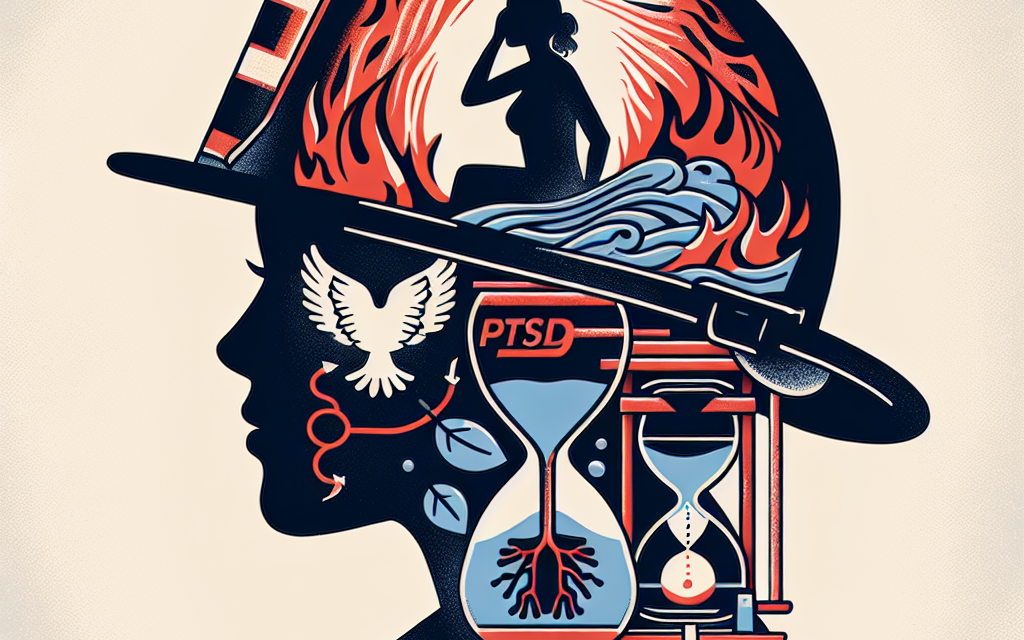PTSD and Anxiety: Their Impact on Fertility Challenges in Women Firefighters
Women firefighters face unique challenges in their profession, including exposure to traumatic events that can lead to mental health issues such as Post-Traumatic Stress Disorder (PTSD) and anxiety. These psychological conditions can significantly impact various aspects of their lives, including fertility. This article delves into the intricate relationship between PTSD, anxiety, and fertility challenges specifically in women firefighters, exploring the psychological, physiological, and social dimensions of this issue.
Understanding PTSD and Anxiety in Firefighters
Firefighting is an inherently stressful profession, often exposing individuals to life-threatening situations and traumatic events. Women in this field may experience PTSD and anxiety at rates comparable to or even higher than their male counterparts due to various factors, including gender discrimination and the challenges of working in a male-dominated environment.
The Nature of PTSD and Anxiety
PTSD is a mental health condition triggered by experiencing or witnessing a traumatic event. Symptoms can include flashbacks, nightmares, severe anxiety, and uncontrollable thoughts about the event. Anxiety, on the other hand, encompasses a range of disorders characterized by excessive worry, fear, and apprehension. Both conditions can manifest in various ways, affecting emotional well-being and physical health.
Prevalence Among Firefighters
Research indicates that firefighters are at a higher risk for developing PTSD and anxiety compared to the general population. A study published in the Journal of Traumatic Stress found that approximately 20% of firefighters experience PTSD at some point in their careers. Women firefighters may face additional stressors, including gender bias and the pressure to prove themselves in a predominantly male field.
Symptoms and Diagnosis
Symptoms of PTSD and anxiety can vary widely among individuals. Common symptoms include:
- Intrusive memories or flashbacks of traumatic events
- Avoidance of reminders of the trauma
- Negative changes in mood and cognition
- Hyperarousal, including irritability and difficulty sleeping
- Physical symptoms such as increased heart rate and sweating
Diagnosis typically involves a thorough assessment by a mental health professional, who may use standardized questionnaires and interviews to evaluate symptoms and their impact on daily functioning.
The Physiological Impact of PTSD and Anxiety on Fertility
The relationship between mental health and reproductive health is complex. PTSD and anxiety can lead to physiological changes that may affect fertility in women firefighters. Understanding these changes is crucial for addressing fertility challenges in this population.
Hormonal Imbalances
Chronic stress, often associated with PTSD and anxiety, can lead to hormonal imbalances that affect reproductive health. The hypothalamic-pituitary-adrenal (HPA) axis, which regulates stress responses, can become dysregulated, leading to altered levels of cortisol and other hormones. Elevated cortisol levels can disrupt the menstrual cycle and ovulation, making conception more difficult.
Impact on Menstrual Cycle
Women experiencing high levels of stress may notice irregularities in their menstrual cycles. Stress can lead to:
- Delayed ovulation
- Shortened luteal phase
- Increased menstrual pain
These changes can complicate efforts to conceive, as regular ovulation is essential for fertility.
Physical Health Consequences
PTSD and anxiety can also lead to physical health issues that may indirectly affect fertility. For instance, women with these conditions may experience:
- Weight gain or loss due to changes in appetite
- Increased risk of chronic conditions such as hypertension and diabetes
- Substance abuse as a coping mechanism
These factors can further complicate fertility and overall reproductive health.
The Psychological Barriers to Seeking Help
Despite the clear impact of PTSD and anxiety on fertility, many women firefighters may hesitate to seek help due to stigma, fear of judgment, or a lack of understanding about their conditions. This reluctance can exacerbate their challenges and delay necessary interventions.
Stigma Surrounding Mental Health
Stigma surrounding mental health issues remains a significant barrier for many individuals, particularly in high-stress professions like firefighting. Women may fear that disclosing their mental health struggles could lead to:
- Negative perceptions from colleagues
- Impact on career advancement
- Loss of job security
This stigma can prevent women from seeking the support they need, leading to a cycle of untreated mental health issues and fertility challenges.
Lack of Awareness and Education
Many women firefighters may not fully understand the connection between mental health and fertility. A lack of education on this topic can lead to misconceptions and a failure to recognize the importance of addressing mental health as part of a comprehensive approach to reproductive health.
Fear of Disclosure
Women may also fear that seeking help for PTSD or anxiety could lead to mandatory reporting or disciplinary action within their fire departments. This fear can deter them from accessing mental health resources, further compounding their struggles with fertility.
Support Systems and Resources for Women Firefighters
Addressing the mental health needs of women firefighters is crucial for improving their overall well-being and fertility outcomes. Support systems and resources can play a vital role in helping these women navigate their challenges.
Peer Support Programs
Peer support programs can provide a safe space for women firefighters to share their experiences and seek guidance from others who understand their unique challenges. These programs can foster a sense of community and reduce feelings of isolation.
Access to Mental Health Services
Fire departments should prioritize access to mental health services for their employees. This can include:
- On-site counseling services
- Partnerships with local mental health providers
- Workshops on stress management and coping strategies
By making mental health resources readily available, fire departments can help reduce stigma and encourage women to seek the support they need.
Education and Training
Providing education and training on the connection between mental health and fertility can empower women firefighters to take charge of their reproductive health. This can include:
- Workshops on stress management techniques
- Information sessions on fertility and reproductive health
- Resources for navigating mental health challenges
By increasing awareness and understanding, fire departments can help women firefighters make informed decisions about their health.
Case Studies and Real-Life Experiences
Examining real-life experiences of women firefighters can provide valuable insights into the challenges they face regarding PTSD, anxiety, and fertility. These case studies highlight the importance of addressing mental health in this population.
Case Study 1: Sarah’s Journey
Sarah, a 35-year-old firefighter, experienced a traumatic event during a rescue operation that left her with severe PTSD. She struggled with anxiety and depression, which affected her menstrual cycle and made it difficult for her to conceive. After seeking help from a mental health professional, Sarah learned coping strategies and began to address her mental health issues. With time and support, she was able to regulate her menstrual cycle and successfully conceive.
Case Study 2: Jessica’s Experience
Jessica, a 30-year-old firefighter, faced significant stigma when she disclosed her struggles with anxiety to her colleagues. Fearful of judgment, she delayed seeking help, which exacerbated her fertility challenges. After attending a peer support group, Jessica found the courage to seek therapy and learned about the impact of stress on her reproductive health. With the support of her peers and mental health professionals, she was able to navigate her fertility journey more effectively.
Case Study 3: The Role of Fire Departments
A fire department in California implemented a comprehensive mental health program for its employees, focusing on education, peer support, and access to mental health services. As a result, female firefighters reported feeling more supported in their mental health journeys, leading to improved overall well-being and fertility outcomes. This case study highlights the importance of proactive measures in addressing mental health within the firefighting community.
Conclusion: Bridging the Gap Between Mental Health and Fertility
The intersection of PTSD, anxiety, and fertility challenges in women firefighters is a complex issue that requires attention and action. By understanding the psychological and physiological impacts of these conditions, addressing stigma, and providing robust support systems, we can help women firefighters navigate their mental health and reproductive health more effectively.
Key takeaways from this article include:
- Women firefighters are at a higher risk for PTSD and anxiety due to the nature of their work.
- These mental health conditions can lead to hormonal imbalances and physical health issues that affect fertility.
- Stigma and lack of awareness can prevent women from seeking help for their mental health challenges.
- Support systems, including peer programs and access to mental health services, are crucial for addressing these issues.
- Real-life experiences highlight the importance of proactive measures in supporting women firefighters’ mental health and fertility.
By fostering a culture of understanding and support, we can empower women firefighters to prioritize their mental health and reproductive well-being, ultimately leading to healthier outcomes for them and their families.





